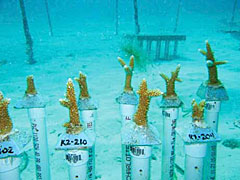Despite their ecological and economic importance, Florida’s coral reefs are teetering on the verge of collapse. Scientific studies point to the impact of effluent discharges from municipal storm and wastewater treatment facilities along the coast. Other reports document the physical destruction caused by boat groundings, fishing equipment, and recreational divers. Policy makers seeking to reverse the coral decline are contemplating additional regulations on coastal point sources, increased fines for boat collisions, and extended Endangered Species Act protections. All regulatory in nature, these policies are aimed at equating the private and social costs of reef deterioration.
This report explores the viability of an alternative framework for managing Florida’s coral reefs, one based on clearly defined, secure, and transferable property rights. Rather than relying on the political process to determine the optimal level of reef protection, such property rights would allow voluntary trades to occur between competing reef users, namely divers, anglers, boat captains, conservation organizations, and coastal communities. Already, conservation entrepreneurs have developed methods for growing imperiled coral species in nurseries and replanting them on reefs. A market-based management approach that rewards this kind of innovative stewardship—and creates accountability for reef deterioration—has greater potential to enhance Florida’s coral resources than the command-and-control policies currently under consideration.





